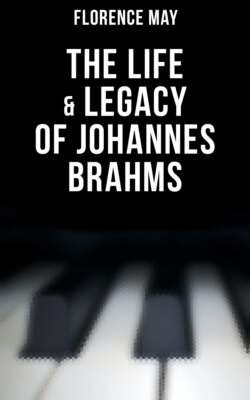Читать книгу The Life & Legacy of Johannes Brahms - Florence May - Страница 9
На сайте Литреса книга снята с продажи.
ОглавлениеIt was in this frame of mind that I took my seat in the evening to hear the concert. Having got over the first excitement of seeing Brahms again, and knowing what I had to expect in regard to his personal appearance, I was able to listen to the music in a more composed mood than had been possible to me in the morning. My pleasure in the performance of the concerto was, of course, in some measure impaired by the circumstance that the long, intricate work was quite new. I think, however, that I should have enjoyed it more if Brahms had conducted and Bülow performed the solo. I did not think Brahms' playing what it had been. His touch in forte passages had become hard, and though he might, perhaps, be said to have mastered the difficulties of his part, he had not sufficiently surmounted them to execute them with ease. It could not, in fact, have been otherwise. No composer having attained to the height of Brahms' greatness could have kept his technical command of the pianoforte unimpaired; life is too short for this. I knew, however, that I had listened to a magnificent work of immense proportions, and longed for opportunity to hear it again that I might assimilate it.
There was a scene of tumultuous enthusiasm at the close of the work. The public applauded wildly, and shouted itself hoarse; the band joined in with its fanfare of trumpet and drum; Brahms and von Bülow were recalled again and again, separately and together; and in the moment of the great composer's triumph I saw the earlier Brahms once more standing before me, for, whilst his eyes shone and his face beamed with pleasure, I recognised in his bearing and expression the old familiar look of almost diffident, shy modesty which had been one of his characteristics in former days.
I did not, of course, seek for a further opportunity of speaking to Brahms on the evening of which I am writing, but I laid my plans for the next morning, and at the proper hour again made my way to the Singakademie and successfully begged for admission to the rehearsal.
During the first part Brahms sat as one of the audience in the front row of stalls, and in a convenient break between the pieces I sent my English visiting-card to him, having written on it a few lines recalling myself to his remembrance. He read it and looked round. 'I know that already,' he said coldly, but rising and coming towards me. 'I saw you yesterday.' 'But you did not know who I was?' I returned, still sceptical. 'Yes, I knew.' 'It seemed to me quite impossible you could have recognised me!' I ejaculated. 'Oh yes, yes—oh yes!' said Brahms in quite a different tone, and for a couple of seconds I forgot to look up or say anything.
'Are you taking notes?' he asked by way of recalling me to myself, touching my pencil. But the rehearsal had to proceed, and Brahms presently took his place on the platform with Bülow for the performance of the Concerto in D minor. When the rehearsal was over, I did not leave the hall so quickly as on the previous day, but waited in the hope of getting another word with Brahms, and was rewarded by having a good many.
In the evening, as he faced the audience before the commencement of the concerto, catching sight of me in the third row of stalls, he was at the pains to bestow upon me a kind bow and smile of recognition. He glanced slightly at me again once or twice during the evening, and I knew, though his appearance still seemed a little strange to me, that Brahms was in the world after all.
The execution of the D minor Concerto was one of those rare performances that remain in the memory as unforgettable events. Brahms, when conducting, indulged in no antics, and was sparing of his gestures, often keeping his left hand in his pocket, or letting it hang quietly at his side; but he cast the spell of his genius over orchestra and pianist alike. The performance was remarkable for its power and grandeur, but not chiefly so, for these qualities were to be expected. It was made supremely memorable by the subtle imagination that touched and modified even the rather hard intellectuality of von Bülow's usual style. Good performances of Brahms' orchestral works may not seldom be heard, and great ones occasionally; but the particular quality of his poetic fancy, by which, when conducting an orchestra, he made the music sound from time to time as though it were floating in some rarefied atmosphere, vibrating now with fairy-like beauty and grace, now with ethereal mystery, was, I should say, peculiar to himself, and is hardly to be reproduced or imitated.
As soon as Brahms had finished his share in the evening's programme I quitted the hall, for I was thoroughly exhausted by the excitement of the past two days, and felt I could bear nothing more. Early the next morning he left Berlin to fulfil engagements in another town.
